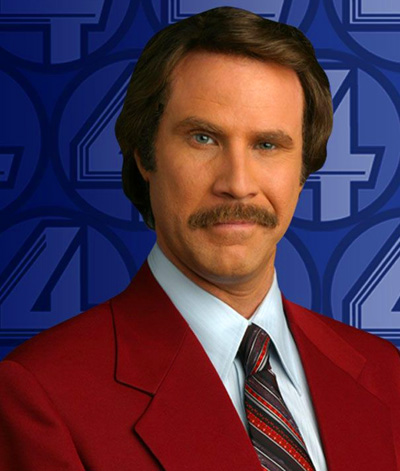 |
| You stay classy, Orlando! |
Ron Burgundy liked to say that he was "kind of a big deal," but the reality is that as the 2012 election cycle heats up, it's Florida that really is a big deal.
Last week, CNN and the Tea Party Express hosted a Republican presidential debate in Tampa, and now this week will see both CPAC Florida and the Presidency 5 debate and straw poll.
Governor Rick Scott was interviewed on Fox & Friends yesterday, and remarked that Ronald Reagan, George Bush, and Bob Dole all won Florida's straw poll and then went on to win the Republican presidential nomination, so he believes that whoever wins the Presidency 5 straw poll will be the 2012 Republican nominee:
The 2012 presidential candidates (the Republican primary candidates and Barack Obama) have all already spent significant time in the Sunshine State, and we can expect this to continue through 2012. We're not just the fourth largest state in the country (after California, Texas, and New York), we're also the largest swing state in the country. With Texas expected to remain firmly Republican, and California and New York leaning left, Florida doesn't just have a lot of electoral votes; we have a lot of electoral votes that both sides believe they have a chance of winning.
The committee has been appointed to select the date for Florida's presidential primary, and all signs are pointing to it being an early date. I agree with the Crowley Political Report's post from last week:
Crowley Political Report | Why Florida should move its presidential primary ahead of New Hampshire
Well let's have some real fun and have the primary Tuesday, Dec. 6, 2011.
The very thought of this would drive the folks in Iowa and New Hampshire nuts. Both states insist that their events must take place before any other state.
Every four years, bigger, more important state such as Florida, wonder why they continue to let Iowa and New Hampshire bully them. And every four years they cave.
State law in New Hampshire requires the Granite state to have its reality show, we mean primary, at a week before any other state primary. So they would be forced to move their primary to November. Iowa would have to make a similar move.
While this would cause great consternation withing the Republican National Committee, such a move would finally break the stranglehold that Iowa and New Hampshire have on the nation's politics...
In contrast, the Orlando Sentinel gets the issue completely and utterly wrong in an editorial this morning:
Orlando Sentinel | Don't cut into line on presidential primaries
The Sentinel admonishes the legislature not to "go rogue" by picking an early primary date and frets that if Florida is penalized by the GOP by losing delegate votes at the presidential convention, that would "diminish the clout" of Florida voters. The Sentinel completely misinterprets what convention delegates actually do, namely, that they cast their votes months after the primary elections are over. One of the biggest effects (and benefits) of Florida having an early primary is that our choice for the presidential nominee is likely to heavily sway the momentum in states that follow us. The formal, official votes at the convention have been nothing more than a coronation ceremony for a long time.
What the Sentinel also neglects to mention is that the old way, where Florida's primary was scheduled so late in the calendar, made our votes almost entirely irrelevant in the selection of the nominee. Of course, Florida Republicans should work with the national party to reform the primary calendar process, but it wasn't until Florida bucked the system that reform suggestions actually started getting taken seriously. We are the 800 lb. gorilla in the room and we will not be ignored.
Even beyond Floridians' own selfish desires for a more influential role in the nominee selection process, it's in the best interests of the Republican Party for Florida to have an early primary. Florida's diverse demographics reflect the overall United States more accurately than smaller, more homogeneous states like Iowa. We have significant populations of every racial, ethnic, and religious minority, and people who represent a wide variety of economic interests. A candidate who wins in Florida has proven that they can appeal to the many different types of voters whose support they will need to win nationwide.
Moreover, navigating Florida politics requires candidates to learn many of the same issues that they would face as President. We're a heavily populated but also widespread state with a lot of transportation problems, national security issues with multiple international airports/seaports and military bases, unique immigration challenges with our neighbors (Cuba, Haiti, etc.), an agriculture industry struggling to make the transition into the 21st century, an increased urgency for Medicare and Social Security reform due to our elderly population, special environmental issues (miles of coastline, the Everglades, the Gulf oil spill, endangered native species, etc.), and a real estate market that has been especially hard hit by the current recession. A candidate who can discuss and debate Florida's varied issues with intelligence and depth seems likely to be able to competently handle any national-level issue that comes their way.
For further reading, here's another great article on the topic of Florida's primary date and our role in the upcoming 2012 elections:


No comments:
Post a Comment